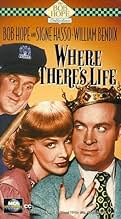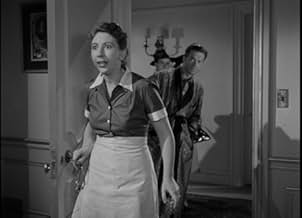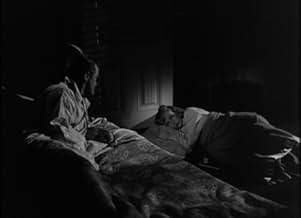Füge eine Handlung in deiner Sprache hinzuThe American son of an Eastern European monarch wounded in an assassination attempt becomes a target for a terrorist organization.The American son of an Eastern European monarch wounded in an assassination attempt becomes a target for a terrorist organization.The American son of an Eastern European monarch wounded in an assassination attempt becomes a target for a terrorist organization.
- Auszeichnungen
- 1 wins total
Empfohlene Bewertungen
Only two hundred votes for this so far... Turner Classics must not show this one very often. Bob Hope is "Michael Valentine", who happens to be the sole heir to the throne of Barovia. When the king is knocked off, the country officials kidnap Valentine to bring him back to Barovia. Of course, this will interfere with his wedding plans. It's the usual combination of Hope's ongong one-liners and physical gags, as he tries to escape so he can get married. William Bendix is the other big name here... he is the girlfriend's big brother, who has hated Valentine all along. The usual mix-ups, mis-understandings, and running around the mulberry bush. Dead bodies that appear and disappear. Bob Hope made this one right in the middle of all the "Road to " films. Of course there's a dig at Bing Crosby as they run past a poster of Crosby. Also the ending felt a little confusing and tacked on; they could have ended the film about 5 minutes earlier and it would have made more sense. Signe Hasso co-stars as the blonde general from Barovia. It's a fine performance by everyone. The writing isn't as clever as some of the other Hope films, but it's acceptable entertainment. Directed by Sidney Lanfield, who had directed SIX films with Hope. Writer Shavelson had been nominated for two Oscars. This is part of a double DVD with Monsieur Beaucaire from Universal.
The country of Barovia is in a real pickle. A terrorist organization called The Mordia threatens to take over especially after an assassination attempt on the last king, leaves him critically wounded and clinging to life.
The king's only heir; the product of a youthful indiscretion when he was sowing some wild oats in America and guess who that is. General Signe Hasso in her best imitation of Greta Garbo in Ninotchka is sent to bring Hope back to Barovia.
Hope, who's a radio host in New York and engaged to Vera Marshe, is less than enthusiastic about the job of king, especially with the Mordia trying to kill him. But there's Hasso so the situation does have its compensations.
Where There's Life is an odd man out among Rapid Robert's films of the forties when Hope was at the high point of his career. It only runs for 75 minutes, unusually short for an A film. It's funny in a lot of spots, but not nearly as good as others he was doing at this time like Monsieur Beaucaire or The Paleface.
Where There's Life does have some good supporting players for Hope and Hasso with Dennis Hoey, George Coulouris, and George Zucco as various Barovian nationals. And of course it has the incomparable William Bendix.
Bendix, though a supporting actor at Paramount, was a star on radio with The Life of Riley at this time. He plays a New York City police officer and prospective brother-in-law to Hope. Devoted fans of Chester A. Riley will get to hear him utter his favorite radio catchphrase, 'what a revolting development this is.'
Will Barovia get out of a Hopeless situation?
The king's only heir; the product of a youthful indiscretion when he was sowing some wild oats in America and guess who that is. General Signe Hasso in her best imitation of Greta Garbo in Ninotchka is sent to bring Hope back to Barovia.
Hope, who's a radio host in New York and engaged to Vera Marshe, is less than enthusiastic about the job of king, especially with the Mordia trying to kill him. But there's Hasso so the situation does have its compensations.
Where There's Life is an odd man out among Rapid Robert's films of the forties when Hope was at the high point of his career. It only runs for 75 minutes, unusually short for an A film. It's funny in a lot of spots, but not nearly as good as others he was doing at this time like Monsieur Beaucaire or The Paleface.
Where There's Life does have some good supporting players for Hope and Hasso with Dennis Hoey, George Coulouris, and George Zucco as various Barovian nationals. And of course it has the incomparable William Bendix.
Bendix, though a supporting actor at Paramount, was a star on radio with The Life of Riley at this time. He plays a New York City police officer and prospective brother-in-law to Hope. Devoted fans of Chester A. Riley will get to hear him utter his favorite radio catchphrase, 'what a revolting development this is.'
Will Barovia get out of a Hopeless situation?
Bob Hope hadn't quite attained top stardom outside the "Road" movies when this B-grade comedy was made, and while he's make occasional worse films later, this mediocrity is very much a routine studio product of its time. He's an NYC radio personality who is suddenly in demand by friends and foes of a fictional nation whose king is dying from an assassination attempt--and Bob is supposedly the unknowing heir to the throne, having been the product of a secret affair with an American long ago. It sounds like fun to put the comic in some Ruritania's political intrigue, but after its prologue, the movie never leaves Manhattan, where our cowardly hero is chased around by various undercover government agents (including Signe Hasso as a supposed general, in a weak stab at "Ninotchka"-type dynamics) and his own would-be assassins. All this keeps him away from planned nuptials with his fiancee and her cop brother (William Bendix), whose subplot is more amusing than the main narrative. But nothing here is very inspired. Hope talks a lot of fast patter as usual, but it's not GOOD patter, and the situations aren't clever or novel enough to make them funnier. It's not a bad movie, just a thoroughly forgettable that doesn't do anyone involved any particular favors.
I guess in order to fully appreciate the likes of Bob Hope as a comedian (and admit that he's a funny guy), it all comes down to something of an acquired taste. But, with that said, even after seeing him in a number of films, I still haven't come anywhere near to acquiring that taste of total appreciation for this dude.
To me, Bob Hope, far too often, comes across as being one of the driest, most bland, and most unfunny comics of his era. In fact, there are moments when Hope's screen-persona gives me the creeps, big-time, especially when his character is required (amongst other things) to be a hot-blooded lover-boy type to some semi-smouldering babe.
From my point of view, Hope's apparent male-magnetism and believability as a virile specimen of raw manhood registers (on a scale of 1-10) at about 2. And 2 is also about the very same position where Hope's appeal as an all-round comic seems to sit, as well.
In "Where There's Life", Hope is radio personality, Michael Valentine, on WKDC in New York.
Valentine soon finds out (in a roundabout way) that he is the long-lost heir to the throne of the mythical kingdom of Borovia. This, in turn, makes him a target of spies, kidnapping, and death plots, as well as the desire of not one, but two, very determined women. (You go figure)
To me, Bob Hope, far too often, comes across as being one of the driest, most bland, and most unfunny comics of his era. In fact, there are moments when Hope's screen-persona gives me the creeps, big-time, especially when his character is required (amongst other things) to be a hot-blooded lover-boy type to some semi-smouldering babe.
From my point of view, Hope's apparent male-magnetism and believability as a virile specimen of raw manhood registers (on a scale of 1-10) at about 2. And 2 is also about the very same position where Hope's appeal as an all-round comic seems to sit, as well.
In "Where There's Life", Hope is radio personality, Michael Valentine, on WKDC in New York.
Valentine soon finds out (in a roundabout way) that he is the long-lost heir to the throne of the mythical kingdom of Borovia. This, in turn, makes him a target of spies, kidnapping, and death plots, as well as the desire of not one, but two, very determined women. (You go figure)
Fast-paced, entertaining and fairly consistently funny: Hope's absurdist puns have a higher-than-usual hit-to-miss ratio, and Signe Hasso is the perfect straight woman. Good supporting cast as well, including George Zucco as - you guessed it - a baddie. *** out of 4.
Wusstest du schon
- WissenswertesOne of over 700 Paramount Productions, filmed between 1929 and 1949, which were sold to MCA/Universal in 1958 for television distribution, and have been owned and controlled by Universal ever since. Its initial telecast took place in Seattle Friday 21 November 1958 on KIRO (Channel 7); it first aired in Omaha Wednesday 7 January 1959 on KETV (Channel 7), followed by Milwaukee 5 May 1959 on WITI (Channel 6), by Denver 13 May 1959 on KBTV (Channel 9), by Phoenix 31 October 1959 on KVAR (Channel 12), by Boston 8 November 1959 on WBZ (Channel 4), by Detroit 9 March 1960 on WJBK (Channel 2), by Chicago 26 August 1960 on WBBM (Channel 2), by New York City 19 September 1960 on WCBS (Channel 2), and finally by Los Angeles 5 November 1960 on KNXT (Channel 2). It was released on DVD 8 October 2002 in tandem with Mit Pinsel und Degen (1946) as part of Universal's Bob Hope: The Tribute Collection, and again as a single 17 November 2015 as part of the Universal Vault Series. During this time, it's also had occasional airings on cable TV on Turner Classic Movies.
- PatzerForeign nationals from Boravia in Europe kidnap American citizen Bob Hope (who presumably has no passport or visa) and put him on their plane without any security checks at the airport.
- Zitate
Gen. Katrina Grimovitch: Michael, run!
Michael Joseph Valentine: Run? Do you think I'm yellow?
[after gunshot breaks glass]
Michael Joseph Valentine: Shake hands with a lemon!
- Crazy CreditsOpening title card - "This is Barovia.. A small European country which even today has not fully recovered from the effects of ruthless enemy occupation..."
- VerbindungenFeatured in The 75th Annual Academy Awards (2003)
Top-Auswahl
Melde dich zum Bewerten an und greife auf die Watchlist für personalisierte Empfehlungen zu.
- How long is Where There's Life?Powered by Alexa
Details
- Erscheinungsdatum
- Herkunftsland
- Sprache
- Auch bekannt als
- Kungen från New York
- Drehorte
- Santa Monica, Kalifornien, USA(Douglas Airport)
- Produktionsfirma
- Weitere beteiligte Unternehmen bei IMDbPro anzeigen
- Laufzeit1 Stunde 15 Minuten
- Farbe
- Seitenverhältnis
- 1.37 : 1
Zu dieser Seite beitragen
Bearbeitung vorschlagen oder fehlenden Inhalt hinzufügen

Oberste Lücke
By what name was Where There's Life (1947) officially released in India in English?
Antwort

































